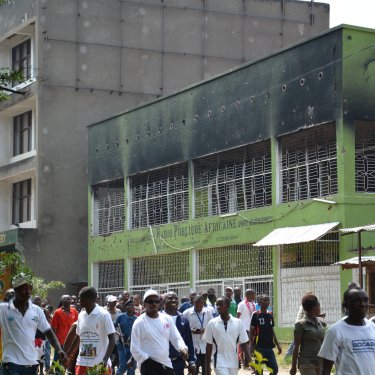One year after coup attempt, journalists still gagged in Burundi

A year has gone by since Bujumbura’s privately-owned radio stations were attacked and closed during a coup attempt on 14 May 2015, but the Burundian government still maintains a tight grip on news and information amid a continuing political crisis.
After being badly damaged during the coup attempt, five radio stations were placed under judicial seal so that the authorities could conduct an investigation. They were Radio Publique Africaine (RPA), which had been prevented from broadcasting since 27 April 2015, Isanganiro, Bonesha FM, Renaissance and Rema FM. Officially, the purpose of this investigation was to identify those responsible for the attacks on the radio stations as well as the stations’ alleged role in the coup attempt. But the authorities have not published the findings of any investigation and most of these radio stations are still closed.
“The government must take a take a clear position on the radio stations that are still closed and on the radio station managers and reporters who are still charged,” said Christophe Deloire, the secretary-general of Reporters Without Borders (RSF). “The findings of the investigation into the radio stations must be published so that they can reopen with complete legality and safety. The government must also provide security guarantees to the journalists who fled the country and those who stayed, so that they are free to work.”
Only two stations have been allowed to reopen – Rema FM, which is close to the government, and Isanganiro, which is independent. The managers of both stations had to sign an undertaking restricting their editorial freedom. But journalists say they are not being treated the same way. Isanganiro is being harassed, they say. Its representatives were summoned by officials and threatened with closure after a broadcast that displeased the government. At the same time, Rema FM was awarded compensation of 4 billion Burundian francs (more than 2 million euros) for the damage it sustained. The award was made by the Gitega appeal court as part of the conclusions it issued on 9 May in the proceedings against the coup attempt’s perpetrators.
The decision to let these two radio stations reopen was taken unilaterally and not in response to the conclusions of the investigation. The directive authorizing them to reopen says they can be closed again at any time on the public prosecutor’s orders. The government is giving itself the power of life and death over the media and taking all possible measures to control what journalists say. The latest measure was the announcement by National Council for Communication vice-president Gabriel Bihumugani at a news conference on 29 April that all journalists would henceforth have to be registered, that all media outlets would have to publish financial and narrative reports “detailing how their budget was used.” This applies to state as well as privately-owned media.
More than 100 journalists have had to flee the country in the past year. Some have started news bulletins that are broadcast from abroad. They include Radio Inzamba’s news bulletin and the “Humura-Burundi” broadcast. But questions hang over their long-term viability. The newspaper Iwaçu meanwhile continues to be published. Editor Antoine Kaburahe (who was recently awarded the City of Paris medal for his courage) edits it from Brussels because a warrant was issued for his arrest. His reporters have to take great care to avoid reprisals and some do not even dare to by-line their articles.
Burundi’s newest media creation, SOS Médias Burundi, also continues to cover the “#BurundiCrisis” around the clock on social networks. Its reporters in Burundi, who provide reports, photos and video, have to remain anonymous and in many cases do not even know each other’s identity because this helps to reduce the dangers to which they are constantly exposed.
Burundi is ranked 156th out of 180 countries in RSF’s 2016 World Press Freedom Index, 11th places lower than its position in the 2015 Index.
Click here for more information about Burundi.



